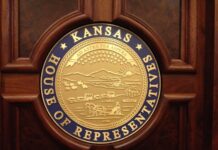A new audit found there were no political strings attached to $2.3 million in private election grants awarded to 25 counties, a funding source that has now been banned in Kansas as part of a national controversy over private financing of elections.
The grants distributed by the nonprofit Center for Tech and Civic Life – and funded partly by Facebook founder Mark Zuckerburg – were used to pay for ballot drop boxes, temporary office staffing, nonpartisan voter education, hazard pay for poll workers during the pandemic and personal protection gear.
The money distributed ranged from $5,000 awarded to about a dozen rural counties to $816,000 to Sedgwick County and $856,000 that went to Johnson County.
The auditors found no indication that any of the counties receiving the money were on the hook for any obligations in return, a finding that prompted a Democratic state senator to call for repealing the ban on election grants.
“There were not any obligations that the counties needed to fulfill,” auditor Macie Smith told the Legislative Post Audit Committee during a hearing Monday.
“They did not need to provide matching funds. They did not need to pay back grant dollars they spent,” she said.
Smith said clerks from some of the counties who received the money said there were no conditions attached to receiving the money.
Another clerk told auditors that the Center for Tech and Civic Life didn’t prescribe how the money should be spent, nor did it suggest vendors.
The grants were to be used to provide safe elections, including personal protection equipment, expanding voter outreach, recruiting and training poll workers, and to support early in-person voting or vote-by-mail options.
Democratic state Sen. Ethan Corson of Prairie Village said the audit was evidence that the Legislature should have waited before passing a law banning the grants and called for its repeal.
In questioning the auditor, Corson noted the report didn’t show that the grants had any undue political influence on the counties that received the money.
Corson said the Legislature should stop what he described as a practice of “shoot first and get the facts later mentality of legislating.”
“We clearly should have waited for the results of this audit before passing this legislation,” Corson said.
Corson said there was no testimony last session to justify the ban on the grants.
“We didn’t hear from a single election administrator when we were working on this,” Corson said.
“Basically all we did is listen to a bunch of rumors, all of which have been discredited by this report and then we legislated based on those rumors,” he said.
Republican state Rep. Kristie Williams immediately responded, saying she was skeptical that Democrats would be accepting of election grants funded by conservative groups.
“I don’t think very many members of your caucus would approve of funding from a Donald J. Trump entity,” said Williams, chair of the audit committee.
“There would be distrust if there was funding from a Donald J. Trump entity that went in to our public sector,” Williams said.
“We have issues of voter integrity that we have to maintain,” she said. “If we need more money, we will fund that.”
The Chicago-based Center for Tech and Civic Life, which received $350 million from Zuckerberg and his wife, Priscilla, began distributing election grants last summer.
The Associated Press reported that the organization was founded in 2012 by former staffers at the Democratic group The New Organizing Institute.
The AP noted the organization’s leadership is now bipartisan and its board includes a Republican former election administrator in the Denver suburbs.
Critics have questioned the motivations and influence of outside groups funding a core government service such as elections, a point that Corson said the audit puts to rest.
The issue bubbled up last fall when the Sedgwick County Commission agreed to accept a $816,000 grant from the organization.
Commissioner Jim Howell at the time said he thought the grant money would be greeted by voters skeptically, although he didn’t think it would influence the election.
Earlier this year, the Kansas Legislature passed a law banning county officials from accepting private grant money to administer an election.
The law made it a felony for election officials to accept or spend money, directly or indirectly, from any person.
Kansas was among five states – along with Arizona, Florida, Georgia and Tennesse – that have enacted laws limiting or prohibiting the use of outside funding for running elections, according to the Brennan Center for Justice.
In response to the audit, Crawford County Clerk Donald Pyle said the law only served to make it harder to provide for core governmental services.
“These grants even spurred the legislature to pass a new law to make it illegal to accept these grants in the future,” Pyle said in his response.
“This is especially upsetting when you understand that these funds helped us to save taxpayer money and most of these funds ended up being spent in our local economy.
“It is even harder to understand this as the Legislature continues to make it harder for local government to pay for the rising costs of the services our residents deserve and demand,” Pyle wrote.
Republican state Sen. Caryn Tyson, who asked for the audit, said the report helped “provide confidence in our state elections.”
“That’s what we need to do. We need confidence for a safe and secure election.”
Democratic state Rep. Vic Miller of Topeka said he could understand how private grant funding might raise concerns, although he didn’t see any issue with the grants that were the focus of the audit.
“Even though I might not be bothered by the grants that were received this last year, I can see a number of scenarios that could be a problematic,” he said.
“I’m not afraid of revisting the legislation,” Miller said, “but I’m also not afraid of the legislation for what it may be preventing in the future.”















